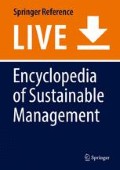References
Anku-Tsede, O., & Kutin, E. (2013). Total reward concept: A key motivational tool for corporate Ghana. Business and Economic Research, 3(2), 173–182. Macrothink Institute.
Armstrong, M., & Brown, D. (2005). Reward strategies and trends in the United Kingdom: The land of diverse and pragmatic dreams. Compensation and Benefits Review, 37, 41–53.
Armstrong, M., & Cummins, A. (2011). The reward management toolkit. A step-by-step guide to designing and delivering pay and benefits (p. 47). London: Kogan Page.
Beck-Krala, E., & Klimkiewicz, K. (2016). Occupational safety and health as an element of a complex compensation system evaluation within an organization. International Journal of Occupational Safety and Ergonomics, 22(4), 523–531.
Bremen, J., & Sejen, M. (2012). Advancing total rewards & the employee value proposition. Worldatwork Magazine, 1, 55–61.
Brown, D. (2014). The future of reward management: From total reward strategies to smart rewards. Compensation and Benefits Review, 46(3), 147–151.
Chen, H., & Hsieh, Y. (2006). Key trends of the total reward system in the 21st century. Compensation and Benefits Review, 38(6), 64–70. https://doi.org/10.1177/0886368706292542.
Gerhart, B., & Ryne, S. L. (2003). Compensation: Theory, evidence, and strategic implications. London: Sage.
Griffin, R. W. (1999). Management. New York: Houghton Mifflin Company.
Gross, S. E., & Friedman, H. M. (2004). Creating an effective total reward strategy: Holistic approach better supports business. Benefits Quarterly, 20(3), 7.
Gulyani G., & Sharma, T. (2018). Total rewards components and work happiness in new ventures: The mediating role of work engagement. Available from: https://www.researchgate.net/publication/325745333. Accessed 11 Aug 2019.
Heneman, L. R., & Coyne, E. E. (2007). Implementing total rewards strategies. Alexandria: SHRM Foundation.
Kaplan, S. L. (2007). Business strategy and Total rewards. Benefit and Compensation Digest, 44(9), 12–19.
Klimkiewicz, K., & Beck-Krala, E. (2015). Responsible rewarding systems – the first step to explore the research area. Research Papers of Wrocław University of Economics.
Lawler, E. (2000). Rewarding excellence: Pay strategies for the new economy. San Francisco: Josse-Bass Publishers/Wiley.
Lyons, F. H., & Ben-Ora, D. (2002). Total rewards strategy: The best foundation of pay for performance. Compensation and Benefits Review, 34(2), 34.
Milkovich, G., & Newman, J. (2001). Compensation. San Francisco: Jossey Bay.
Morris, I. (2006). The future of work: Total reward strategies and Canadian’s aging workforce. Toronto: Rogers Media.
O’Neil, S. (1998). The phenomenon of Total rewards. ACA Journal, 7(3), 8–12.
Rickard, C., Reilly, P., & Brown, D. (2016). Applying a reward strategy in local government, IES, Institute for Employment Studies, Local Government Association UK, 1–32. Retrieved from: https://www.local.gov.uk/sites/default/files/documents/applying-reward-strategy%2D%2Da2d.pdf. November 2018.
Rousseau, D. M. (1995). Psychological Contracts in Organizations: Understanding Written and Unwritten Agreements. Newbury Park, CA: Sage.
Thompson, P. (2002). Total reward. London: Chartered Institute of Personnel Development (CIPD).
Torre, T., & Sarti, D. (2013). Total reward system: Towards an operational model. In: EAISM 4th European reward management conference (Rmc 2013) managing rewards: What can we learn from a comparative approach? Brussels, December 2–3, 2013.
Towers Perrin. (2005). Reconnecting with employees: Quantifying the value of engaging your workforce. London: Towers Perrin Report.
UK Cabinet Office. (2007). Total reward strategy. Available at: www.cabinetoffice.gov.uk/workforcematters
Author information
Authors and Affiliations
Corresponding author
Editor information
Editors and Affiliations
Section Editor information
Rights and permissions
Copyright information
© 2020 Springer Nature Switzerland AG
About this entry
Cite this entry
Beck-Krala, E. (2020). Total Rewards. In: Idowu, S., Schmidpeter, R., Capaldi, N., Zu, L., Del Baldo, M., Abreu, R. (eds) Encyclopedia of Sustainable Management. Springer, Cham. https://doi.org/10.1007/978-3-030-02006-4_203-1
Download citation
DOI: https://doi.org/10.1007/978-3-030-02006-4_203-1
Received:
Accepted:
Published:
Publisher Name: Springer, Cham
Print ISBN: 978-3-030-02006-4
Online ISBN: 978-3-030-02006-4
eBook Packages: Springer Reference Business and ManagementReference Module Humanities and Social SciencesReference Module Business, Economics and Social Sciences

